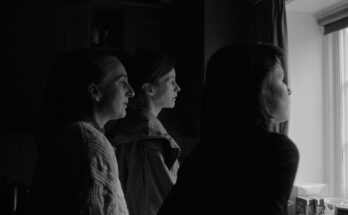Want to hear more from the actors and creators of your favorite shows and films? Subscribe to The Cinema Spot on YouTube for all of our upcoming interviews!
I’ll be forward to start this review off, I am a huge Wes Anderson fan. When my dad was showing me Martin Scorsese and Quentin Tarantino movies growing up, he would cut up viewings of Goodfellas and Reservoir Dogs with Rushmore and The Royal Tenenbaums. If not for Anderson, I would not be as open to different styles of film or appreciate the form as wholly as I do now. I have a deep appreciation for Wes Anderson’s films, and there isn’t a single one of them that I dislike. With that said, The Phoenician Scheme is one of Wes Anderson’s best films and the best film of his since The Grand Budapest Hotel.
The Phoenician Scheme follows industrialist and businessman Zsa-zsa Korda (Benicio del Toro), who tries to improve the infrastructure of Phoenicia by cutting corners and utilizing slave labor. Due to his conniving activities, he is the target of assassination attempts. After a nearly successful one, Korda decides to list his only daughter, Liesl (Mia Threapleton), as the heir to his fortune. However, Liesl is an aspiring nun and sees that her father’s way of life doesn’t align with her values. She gives him the benefit of the doubt and tries to see what his ‘scheme’ is all about.
Discussion
Ever since the pandemic, Wes Anderson’s newest releases ponder on his career, art, and legacy. In The Phoenician Scheme, there’s a convergence of art and one’s existence. What does our life look like after we die? The little bit of narcissism that exists in each of us wants to leave a lasting impression. Wes Anderson’s last two films—i.e., The French Dispatch and Asteroid City—examine the shape of art and how it flows through us. Now, that turns the mirror on Anderson, the person, and how life flows through him. Grand ambition can exist in anyone, but only a few can achieve it. However, what does ambition mean if it’s derived from malevolent intent?
Art is inherently narcissistic; Hell, the best art is entirely narcissistic. With Wes Anderson, his style is uniquely his, and any attempts to replicate it are not successful because they miss the key ingredient – Wes Anderson. The ‘Wes Anderson style’ of film works like a machine. Each aspect of the film is fine-tuned and complements the other. It’s easy to water it down as quirky and charming with the heavy use of color, symmetrical framing, and dry line delivery, but it all lulls the viewer into the experience.
The Wes Anderson Style of Filmmaking
Speaking to The Phoenician Scheme directly, the film begins with a man being blown in half, from the waist up, in the most ‘Wes Anderson’ fashion imaginable. There is a sense of urgency, and the stakes are dire right from the jump. Yet, as soon as Korda is introduced, it devolves into comedy. Few filmmakers can accomplish this brutality and comedy in a unique style and tone. Without the exact elements of which it was done, it wouldn’t work as it should. That also bleeds into the current state of Anderson’s films. These days, he plays in a removal of reality, and The Phoenician Scheme is a prime example of this type of fantasy play.
Since The Life Aquatic with Steve Zissou, Wes Anderson has gradually deviated from the grounds of reality and into the fantastical. Now, his films operate almost exclusively on the fantastical, but doing so has allowed him to be more vulnerable with the viewer. Fantastic Mr. Fox, an animated feature film, gave Wes Anderson the opportunity to fully steep into ideas of oneself that don’t have to recognize its human element.
Oates’s Take on Art in a Wes Anderson Film
American writer Joyce Carol Oates tweeted that “‘acting’ in a Wes Anderson film is participating in a kind of cartoon” to demonstrate a point about Jodie Foster not participating in a Wes Anderson film. While the ‘cartoon’ point refers to Jodie’s possible lack of involvement in Anderson’s work, this criticism isn’t entirely a bad one. This removal from reality operates almost as a hideaway of sorts, but the results can be soul-stirring. The love for Anderson’s early work is still there. Regardless, the amount of himself and his ethos being poured into the current stage of his career is astounding.

Final Thoughts on The Phoenician Scheme
The Phoenician Scheme is Wes Anderson at his most personal. Anderson takes down his own style and ideas of legacy under the guise of an espionage dark comedy. While it isn’t entirely direct with its intent, given the shroud of its stylized world, the ideas are still present. The story doesn’t entirely work at times either. Anderson and executive producer Roman Coppola’s (The Darjeeling Limited, Moonrise Kingdom, Mozart in the Jungle, Isle of Dogs, The French Dispatch, Asteroid City) screenplay is a little more jam-packed than it needs to be.
While I love The Phoenician Scheme, it is an erratic film. There is so much to uncover and deconstruct within it, and I would say this review is equally erratic. By the time the credits roll, I feel fulfilled as if I just consumed a good meal. There’s a tenderness at play that breaks through the style and latches onto the viewer. Any movie that can accomplish this sensation is a tremendous winner – warts and all. The Phoenician Scheme is an incredible film and one of Wes Anderson’s greatest works.
4.5/5 stars
Wes Anderson’s The Phoenician Scheme is now playing in select theaters!
For more action, comedy, drama, and thriller-related news and reviews, follow The Cinema Spot on Facebook, Twitter, Instagram, and Bluesky! Also, follow us on Letterboxd for further feature film, short film, and limited series reviews!
Recovering Texan. Full time consultant, part time writer.



